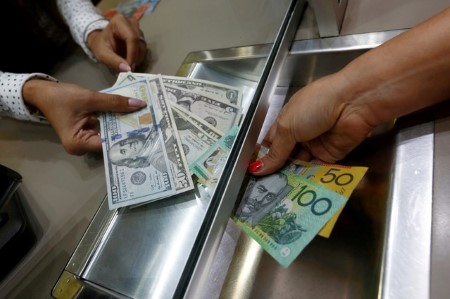




Policy Rate Updates: BSP outlook — cloudy with a chance of rate cut
 DOWNLOAD
DOWNLOAD

January Economic Update: Growth slows, prices rise
 DOWNLOAD
DOWNLOAD

Inflation Update: Up, up, and away?
 DOWNLOAD
DOWNLOAD


Dollar firm vs Aussie, euro on heightened recession worries

SINGAPORE/TOKYO/HONG KONG, Aug 16 (Reuters) – The safe-haven US dollar hovered near a one-week high on Tuesday while the Aussie, euro and Chinese yuan remained under pressure as weak global economic data reignited recession fears.
The dollar index, which measures the greenback against six major peers, held steady at 106.51, just below the previous session’s peak of 106.55, the strongest since Monday of last week.
The euro, the most heavily weighted currency in the dollar index, was little changed at USD 1.0158 after earlier dipping to the weakest since Aug. 5 at 1.0154.
Sterling was 0.1% down at USD 1.2040, the lowest since Aug. 5.
Against the yen, a much sought after haven currency, the dollar eased 0.09% to 133.19.
The global safety bid was driven by a raft of weak world economic indicators. On Monday, data showed US single-family homebuilders’ confidence and New York state factory activity fell in August to their lowest levels since near the start of the COVID-19 pandemic.
That followed surprisingly weak Chinese activity data spanning industrial output, retail sales and fixed-asset investment as a nascent recovery from draconian COVID-19 lockdowns faltered.
Against the offshore yuan, the dollar rose 0.07% to 6.8174, heading back toward Monday’s high of 6.8200, a level last since in mid-May.
The Australian dollar sank as low as USD 0.70005, threatening to drop below the psychological 70 cent mark for the first time since Wednesday.
New Zealand’s kiwi dipped to USD 0.6349, also the lowest since Wednesday.
The Reserve Bank of New Zealand is widely expected to raise rates by half a point again on Wednesday, with the focus on whether policymakers follow the Federal Reserve and Reserve Bank of Australia in shifting to a more data-driven approach.
“The weakness in the US and Chinese economies is typically a bad sign for commodity currencies,” including Aussie and kiwi, Commonwealth Bank of Australia strategist Joseph Capurso wrote in a note to clients.
“The path of least resistance for NZD is lower until the Reserve Bank of New Zealand’s policy meeting tomorrow.”
(Reporting by Kevin Buckland; Editing by Shri Navaratnam)
This article originally appeared on reuters.com





 By Reuters
By Reuters